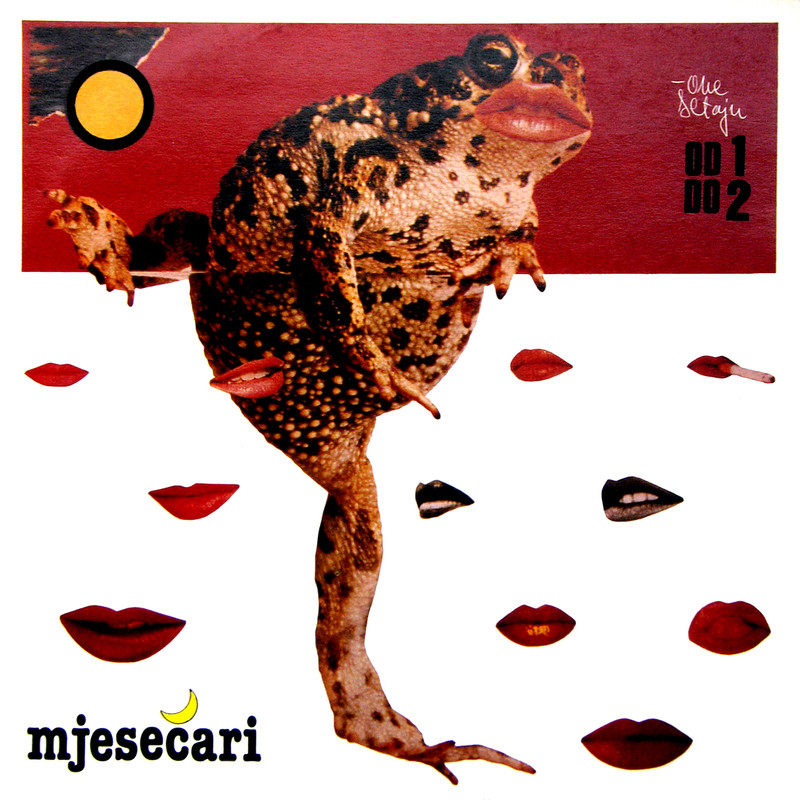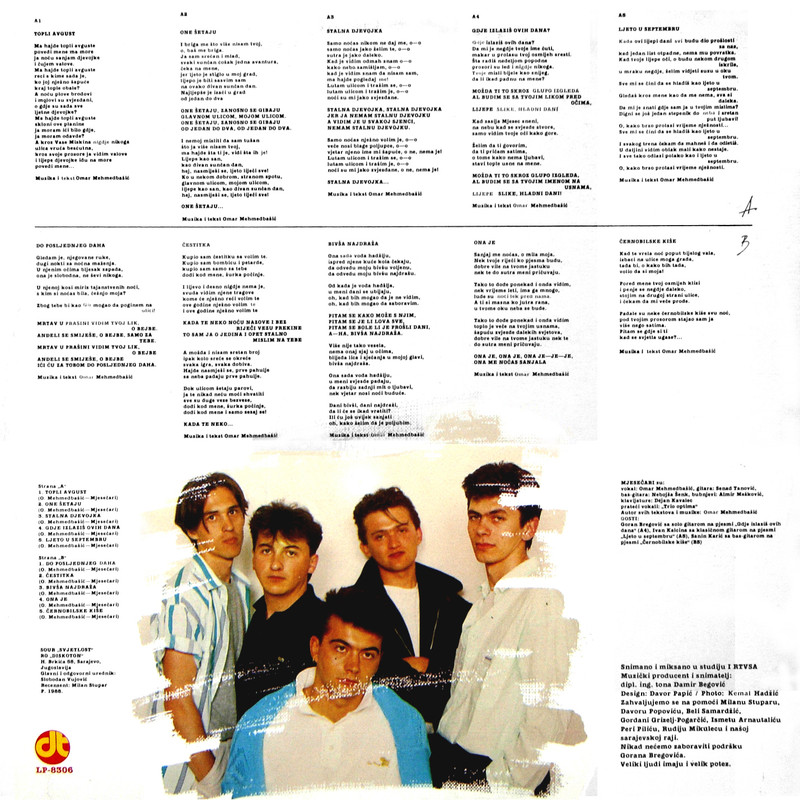MJESEČARI are pop rock band from Sarajevo (Bosnia and Herzegovina) in former Yugoslavia. This is their first album from 1988.
ponedjeljak, 28. veljače 2022.
nedjelja, 27. veljače 2022.
MIŠO KOVAČ - San Francisko (1968) EP
subota, 26. veljače 2022.
LA STRADA - La Strada (1987)
LA STRADA was a former Yugoslav rock band from Novi Sad, Serbia. The band was formed by Slobodan Tišma (guitar, lead vocals) , a rock veteran and poet, and called it "La Strada" by the Federico Fellini movie. The rest of the band consisted of Danijel Stari (bass guitar, arrangements), Boris Oslovčan "Bora" (bass guitar), Siniša Ilić "Siki" (guitar) and Dragan Nastasić "Gane" (guitar) and a temporary drummer Siniša Sekulić "Sekula". The band functioned with two bassists because Stari did not want to perform live and his live replacement was Oslovčan and drummer Sekulić also did not perform live so they used a rhythm machine instead. The lineup made their first recordings in the Vranešević brothers studio which consisted of three songs "On", "Sat" and "Narcis" which were often broadcast on radio Novi Sad's shows "Yu Pop Scena" and "Novi vidici" hosted by Dragan Gojković "Goja", who was monitoring the fast growing world New Wave scene at that time. After the recording of the tracks both of the band's guitarists left the band and were replaced by Predrag Ostojić "Preža" (guitar) and Ivan Fece "Firchie" (full-time drummer). The band made their first live appearance in 1980 in Novi Sad's club No. 1. The lineup Tišma, Oslovčan, Firchie and Ostojić also played as an opening act for Električni Orgazam. In May 1981 the band performed at Subotica "Youth Festival" and at the Danube park handball playground in Novi Sad as an opening act for the band Film. The last appearance the band made at the Belgrade's KST in June 1981. Due to a misunderstanding, bassist Oslovčan left the band and was replaced by Zoran Bulatović "Bale", a former Pekinška Patka member, and Ostojić so Tišma remained the only guitar player. Even though the band was well accepted at Štrand and Pančevo both opening for Lačni Franz, La Strada ceased to exist. Tišma, Firchie and Bale with Marinko Vukomanović of Pekinška Patka formed a new band called "Luna". When Luna disbanded in 1985, Tišma and Stari along with former Luna keyboard player and bassist Jasmina Mitrušić "Mina", Žolt Horvat (guitar) and Robert Radić (drums) (both from Kontratitam and Gomila G) reformed La Strada. In Džuboks magazine's poll La Strada was pronounced as the greatest expectation of 1985. After performing in Belgrade, Novi Sad, Zagreb and other venues, the band entered the studio and recorded material for their debut album, produced by Mitar Subotić which was released in 1987 through radio Novi Sad's M Production, one of the greatest labels in Serbia during the 1980s. The recording and release of the record was financed by radio Novi Sad and the record was released in 500 copies. Unlike Luna's sound, La strada presented a diverse combination of classic pop and rock elements combined with Tišma's poetry. After the release of the album, Horvat, Stari and Mina left the band and were replaced by Zoran Lekić "Leki" (guitar) and Ilija Vlaisavljević "Bebec" (bass). This lineup entered the studio to record six new studio tracks which were never released, and after performing at several venues the band held their last concert in Subotica in 1987. Tišma pursued a career as a poet and released two poetry books. (from wikipedia)
DIVLJI ANĐELI - Divlji anđeli (1982)
DIVLJI ANĐELI was formed in 1982, in Beograd (Serbia) by Nebojša Savić Boca (vocal, guitar), Dragan Đorđević Joe (vocal, guitar), Dejan Lalević (bass) i Miroslav Lekić Šiki (drums). Debut album "Divlji anđeli" they released for PGP RTB on 14th of May same year. Album produced Saša Habić and had one of the biggest hit that year "Voli te tvoja zver".
petak, 25. veljače 2022.
KAKTUS - Kaktus (1983)
četvrtak, 24. veljače 2022.
RADMILA KARAKLAJIĆ - Niko mi ne može suditi (1963-1968)
RADMILA KARAKLAJIĆ is a Serbian pop singer and actress. Her career spans over 6 decades. These are her most famous songs from 1963-1968.
VEDRAN BOŽIĆ - Shuffle (1973-1975)
srijeda, 23. veljače 2022.
DOKTOR SPIRA & LJUDSKA BIĆA - Dijagnoza (1980)

The unique Belgrade singer-songwriter DUŠAN MIHAJLOVIĆ SPIRA (acoustic guitar, vocals) started his musical career during the late 1972 in an acoustic rock duo called Mira i Spira, also featuring Mirjana Marković (vocals). After a series of performances on happenings, especially the ones organized by Pop Mašina members in the Belgrade Sports Hall, Mihajlović achieved a major affirmation after the inclusion of his song "Prvi sneg" into the repertoire of the acoustic rock band Suncokret, being eventually released on their debut album "Moje bube" in 1977. During the late 1970s, Mihajlović had given up the acoustic sound, turning towards the current trends of the time, the upcoming New Wave music, forming the band DOKTOR SPIRA I LJUDSKA BIĆA, which in its initial period had changed numerous lineups. In the lineup Mihajlović (vocals, acoustic guitar), Zoran Dašić (guitar), Stevan Milinković (bass guitar) and Želimir Vasić (drums), the band recorded the debut album "Dijagnoza". The album, produced by Mihajlović himself, featured the unusual and original songs "Buđenje", "Ima dana kada mene moja duša boli", "Dg. Paranoia", "Uvek isto zbogom", and "Igrač na žici", bearing a strong narrative notion of alienation. Recorded in 1980 at the Enco Lesić "Druga Maca" studio in Belgrade and mastered at the Trident studio in London, it featured guest appearance by backing vocalists Mirjana Marković and former DAG member Dragan Popović, the latter being a co-writer of the song "Psychoneu Rosis". At the time, Mihajlović had a cult status among the Belgrade musicians and fans, however, this did not affect the record labels to release the album. Since the Yugoslav record labels refused to release the album, during 1981, Mihajlović went to London and financed himself the printing of 50 copies of the album, which he brought to Belgrade and distributed them to his friends. The LP had a white paper cover without any images and the track listing was written by hand. The album promotion of the exclusive album release was held on December 1981 at the Atelje 212. The band continued performing the material until 1985 when they disbanded. In 1986, the PGP-RTB editor had become the pop rock mucician Oliver Mandić. In a discussion with rock musician Bora Đorđević at a local bistro Mandić claimed that he, as the new editor, would bring changes to PGP-RTB. Đorđević, annoyed with Mandić's statements, made a bet with him to release "Dijagnoza". Without any promotion, the album was released in a minimal printing of 2,000 copies, and quickly sold out. At the time Mihajlović had quit performing and constructed a mini metal guitar and mini wooden bass guitar amp under the "Žuto pile" brand name. However, despite trying to make a breakthrough on the music equipment market, it turned out to be unsuccessful. In 1987, Mihajlović secretly recorded the second studio album, "Dizajn za stvarni svet", featuring diverse musical influences which could stylistically be called world music, even though the expression was not used at the time, combined with krautrock, gothic rock, dance music, boogie, jazz and atonal music. Following the musical and production trends of the time, Mihajlović retained the same lyrical style on the new material as on "Dijagnoza", sung under the domestic influences of such vocalists as Milan Mladenović and Vlada Divljan. The following year, he had moved to London where he currently resides. (from wikipedia)
utorak, 22. veljače 2022.
MLADI - Naftovod (1964-1966)
VOJVOĐANSKI BLUES BAND - Sećeru moj (1986)
VOJVOĐANSKI BLUES BAND is a rhythm and blues band, formed in 1968, in Novi Sad (Yugoslavia). They are still active.
ponedjeljak, 21. veljače 2022.
nedjelja, 20. veljače 2022.
GALIJA - Bez naglih skokova (1984)
subota, 19. veljače 2022.
petak, 18. veljače 2022.
GALIJA - Prva plovidba (1979)
GALIJA formed in 1976 in Niš, Serbia (ex-Yugoslavia). The central figures of the band are brothers Nenad Milosavljević (vocals, acoustic guitar and harmonica) and Predrag Milosavljević (vocals). In 1979 the band released their debut album "Prva plovidba". Nenad Milosvaljević's brother Predrag Milosavljević appeared on the album on vocals as a guest musician, and also wrote most of the album lyrics. The album brought hits "Avanturista", "Gospi" and "Decimen".
četvrtak, 17. veljače 2022.
srijeda, 16. veljače 2022.
ZAFIR HADŽIMANOV - Momci (1964) EP
ZAFIR HADŽIMANOV is a Macedonian folk and pop singer. He has been active in the music industry of former Yugoslavia since the 1960s, and lives in Belgrade, with his Serbian wife, Senka Veletanlić. Hadžimanov was educated in Belgrade, where he received his degree in 1967, and has made music in both Serbian and Macedonian language. This is his second EP from 1964.
Pretplati se na:
Postovi (Atom)

















































